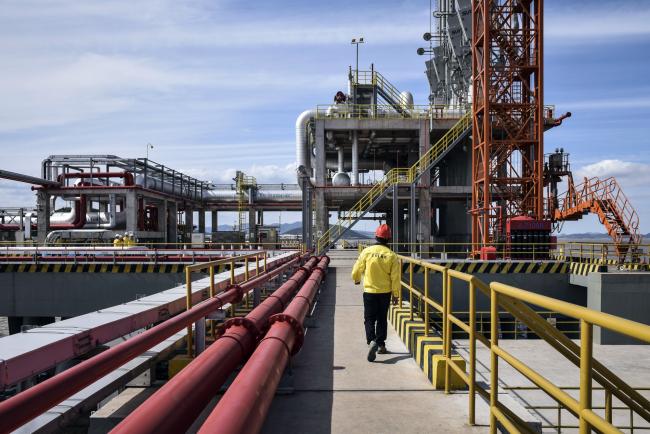(Bloomberg) -- Gas is in such hot demand in China right now it’s allowing a quirky market to flourish: transporting the fuel on trucks.
Call them pipelines on wheels. The country’s top suppliers are loading liquefied natural gas onto tanker trucks and delivering it to users to make up for insufficient pipeline coverage inland. The method is so effective ENN Group is using it as a primary way to move LNG from its new terminal.
This new kind of gas market has thrived in China over the past few years as the government’s blue-sky policies boosted demand for the cleaner-burning fuel faster than pipelines can be built to support them. It’s also unregulated, allowing nimble sellers to benefit from rising prices during peak consumption seasons, while the city-gate benchmark remains at government-set rates.
“We haven’t seen this kind of volume in trucked LNG anywhere else in the world” said Xizhou Zhou, head of China energy research for IHS Markit. “This market in China is a reflection of the market distortion caused by regulated city-gate prices, increasing supply and demand, and price volatility.”
ENN is betting this method of transporting LNG will endure. The distributor’s new terminal in Zhoushan, a tiny island at the mouth of the Yangtze River, is the first in the world built to load the majority of its imports onto trucks instead of reheating them to their gaseous state for pipelines or power plants.
The facility is designed to import about 3 million tons of LNG a year, with 2 million destined for trucks and the rest for pipelines. But trucking the fuel is expensive. It costs nearly six times more than piping it, according to a study by the King Abdullah Petroleum Studies & Research Center in Saudi Arabia.
More Lucrative
Companies like ENN are happy to take this pricier route because it can be more lucrative. Trucked LNG sells for about 4,500 yuan ($650) a ton. That’s two-thirds higher than benchmark Shanghai city-gate rates. Last winter, trucked LNG prices jumped to 7,400 yuan amid a nationwide gas shortage.
The rise of this free-wheeling market shows how China’s natural gas industry, long under the control of the government, is moving toward liberalization. The nation has taken steps toward a free market by auctioning off gas and import terminal space on exchanges, granting third parties access to assets operated mainly by state-owned giants, and revising its pricing mechanism.
Those efforts are also aimed at improving supply efficiency to meet the roughly 20 percent surge in demand. China’s unprecedented crackdown on its noxious smog by replacing coal furnaces with gas burners has become one of the most important factors shaping the global energy market.
Meet Targets
Trucks carried about 19 million tons of LNG to customers last year, accounting for 12 percent of China’s total use, Wood Mackenzie Ltd. estimates. For gas users with limited pipeline coverage, trucking allows them to get hold of supply and meet government’s switching targets, Wen Wang, an analyst at the consultancy firm, said by email.
Given its size, the trucked market could aid China’s transition toward a more market-oriented system. Eliminating gas pricing controls could help save as much as $2.2 billion a year, in part by reducing the use of more expensive trucking, Saudi Arabia’s KAPSARC researchers said in a May report.
“Trucked LNG is helping set the stage for further price deregulation,” Wang said. “As this slice of market grows, more and more users are exposed to market prices instead of regulated prices.”
